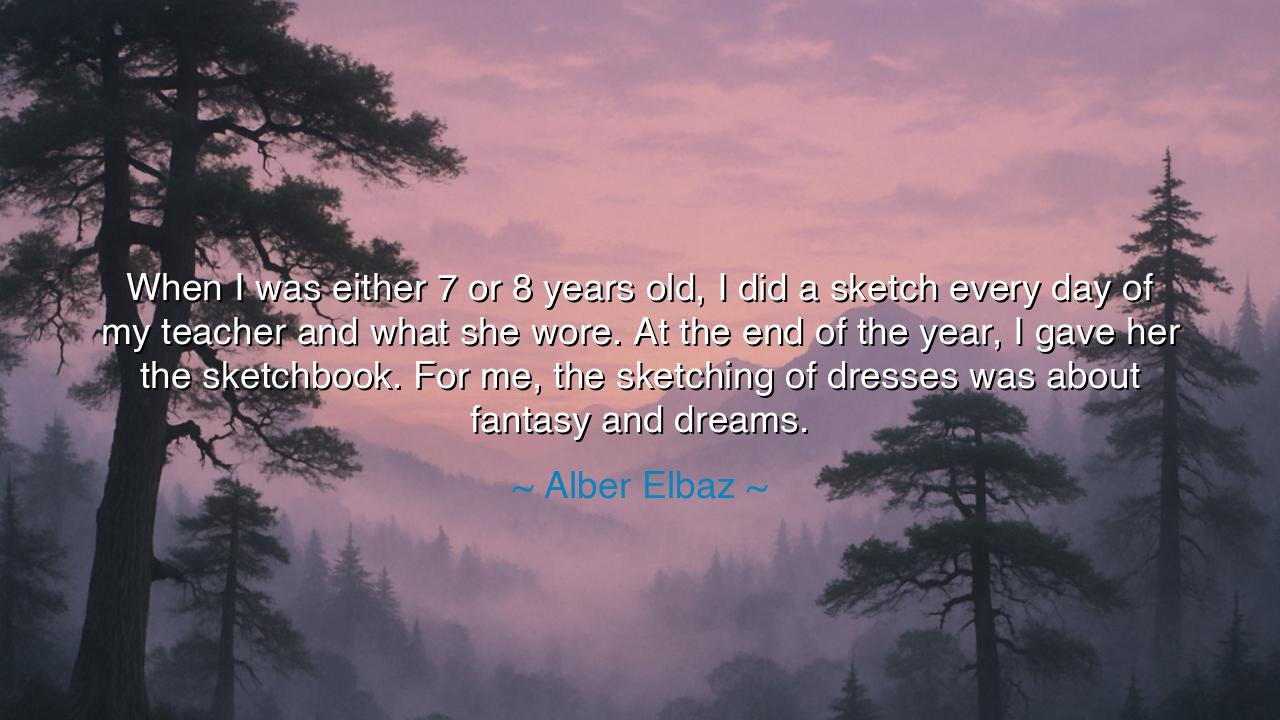
When I was either 7 or 8 years old, I did a sketch every day of
When I was either 7 or 8 years old, I did a sketch every day of my teacher and what she wore. At the end of the year, I gave her the sketchbook. For me, the sketching of dresses was about fantasy and dreams.






When Alber Elbaz said, “When I was either 7 or 8 years old, I did a sketch every day of my teacher and what she wore. At the end of the year, I gave her the sketchbook. For me, the sketching of dresses was about fantasy and dreams,” he was not simply recalling a childhood memory — he was revealing the moment when imagination first touched purpose, when the seed of destiny was sown in the fertile soil of innocence. His words remind us that the greatest journeys often begin in quiet acts of wonder, when the heart of a child dares to dream without fear of failure or judgment. To sketch is to see the world not as it is, but as it could be — and in that act, Elbaz found the language of creation.
The origin of this quote lies in the early life of one of the most beloved figures in fashion. Alber Elbaz, the Moroccan-born Israeli designer who would one day revive the house of Lanvin, began his love affair with beauty long before he touched the fabric of haute couture. As a boy, with no wealth and no fame, he used only paper, pencil, and imagination to capture what he saw — and what he hoped for. Each sketch was a bridge between the ordinary and the divine, between the reality of the classroom and the dream of creation. When he presented the sketchbook to his teacher, it was not a gift of drawings alone — it was the offering of a young soul who had begun to understand that art is love made visible.
In the ancient spirit, Elbaz’s act mirrors the stories of those who found their calling early, guided by curiosity and devotion. The sculptor Michelangelo, as a child, was caught sketching on the walls of his home; the philosopher Plato, as a youth, was consumed by the ideal forms of beauty that would later shape his philosophy. Elbaz, too, was a child of vision. His daily sketches were not acts of repetition, but of revelation — for every day, his teacher’s dress became a new world, a new expression of mood, color, and grace. Through this ritual, he learned one of the eternal truths: that discipline is the servant of inspiration. Dreams, when practiced daily, take root and become destiny.
There is something profoundly moving in his phrase, “For me, the sketching of dresses was about fantasy and dreams.” In these few words, he captures the essence of all creation — the sacred marriage of reality and imagination. The dress, that most human of garments, becomes a vessel of transformation; it shields the body but reveals the soul. For Elbaz, sketching dresses was never merely about fashion — it was about translating emotion into form, turning fleeting moments into lasting beauty. He saw clothing not as luxury, but as poetry made tangible, a way to dream the human spirit into something one could touch, wear, and feel.
Yet Elbaz’s story also teaches that great dreams often begin in small rooms. The boy at his desk, sketching a teacher’s outfit, could not have known that he was shaping the path to his future. His art began in simplicity, but it grew through love — love for beauty, for women, for the elegance of expression. And this love never left him. Throughout his life, Elbaz remained humble, charming, and human — qualities that endeared him to the world. He once said that fashion was not about perfection, but about kindness and connection, about making people feel seen and cherished. That same tenderness beats within this childhood memory — the tenderness of a boy giving his heart, page by page, to a dream.
In this light, we might recall another artist of dreams — Claude Monet, who once said, “I must have flowers, always, and always.” Like Monet’s devotion to color and light, Elbaz’s devotion to design was not a pursuit of fame, but of fulfillment. The fantasy he speaks of is not escapism, but transformation — the human need to find meaning and joy in creation. In a world that often prizes logic over wonder, Elbaz reminds us that dreams are the purest form of truth, for they reveal what reason cannot grasp.
So, my child, take this teaching to heart: nurture your small beginnings, for within them lies the power to shape your destiny. Do not dismiss your fantasies as childish, nor your dreams as impractical. Every masterpiece begins as a sketch; every revolution begins as a vision. Like Alber Elbaz, sketch your own dreams — not with pencils perhaps, but with the labor of your heart. Let your daily acts, however small, become the sketches of your becoming. And when the time comes to share your work with the world, offer it as he did — not for praise, but for love. For those who create from the union of discipline and dream do not merely build careers; they leave behind a legacy of light.






AAdministratorAdministrator
Welcome, honored guests. Please leave a comment, we will respond soon